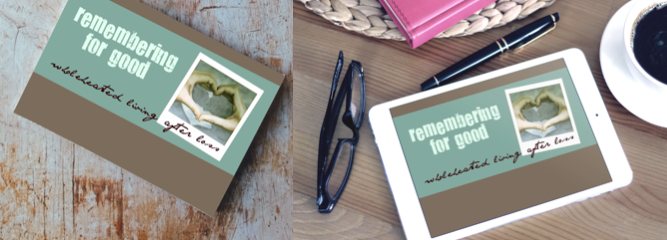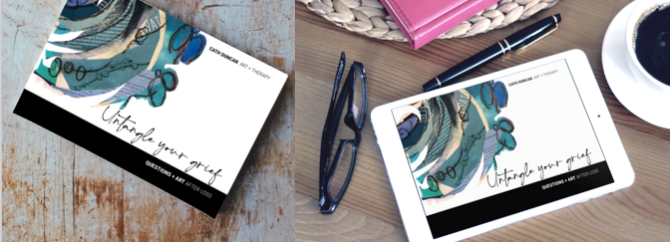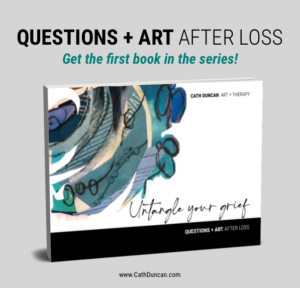“How can I heal?” is one of the most common questions I get after people sign up to my newsletter. Learning to live wholeheartedly after loss is a journey with many different lessons and skills that need to be collected a long the way – and of course our grieving journeys and lessons are quite unique and diverse – but if you’re freshly bereaved and just beginning your journey to healing, and you’re in a lot of pain and asking the question, “How can I heal?” here’s a good place to start…
Decide what healing means to you
Most people I work with arrive with an intimate knowledge of their pain, because that’s pretty much all they’re thinking about all day. Grief is like that at first. This isn’t “bad” – it’s just the way we’re wired to begin the adaptation process. Before we can begin to adapt to our “new normal,” we spend time experiencing and scrutinizing the painful, fearful thing that happened. This is part of the process of making sense of what happened, integrating it into our life narrative and finding a “new normal.”
But sometimes we get stuck there, focusing on the pain, running over all the unanswerable questions over and over again. Our brains are wired to avoid unfamiliarity and if the pain is all we’ve become familiar with and we haven’t got a picture of an alternative way to live anymore, a part of us will resist moving away from the pain – just because it want to stay safe by staying with what’s familiar. You can gently help this part to release it’s resistance and learn that it’s safe to begin to feel differently and move differently in the world now by beginning to build out a detailed picture of how you want to feel, be and live instead of this painful existence.
Go gently, baby steps
Building out this picture will probably feel hard at first. Sometimes it’s just because it’s scary deciding what you want because that means putting your heart on the line again and risking having it and losing it. That’s normal. And if you’ve been lost in pain for a long time, the questions below will feel hard to answer at first, just because the questions are asking you to exercise your imagination in the direction of what you’d love, rather than what you’re most afraid of. That’s a big leap.
So just go gently. Meditate on the questions. Do them in layers… write down some answers today, and come back to them each day, to add a few more details. As you start writing down details, you’re affirming your heart’s desires and this will increase your confidence to answer these questions.
You don’t have to make any big decisions or change anything in your life or do anything to earn healing. These are NOT goals, you’re not accountable to what you write down, and you’re welcome to be inconsistent and write down different answers each day. This is just an exercise in imagination, an exercise to help your heart and mind to gently release the fear and to build out a picture of an alternative to the pain. As you build out that new picture, it’ll become more familiar – at least as familiar as the pain, and before you know it, without doing anything, you’ll notice that your new picture is no longer new and unfamiliar… it’s already become your “new normal.”
Give it a try…
- Have you thought about what exactly “being healed” looks like for you?
- How would you know that you’re healed?
- How would you feel?
- What would your common thoughts be?
- How would you tell the story of your past?
- How would your past losses and traumas inform your current choices and what you create in the world?
- What would you value?
- What would your priorities be?
- What would be different if you had grieved sufficiently and were healed?
- How would you spend your time then?
And now, having answered these questions… how do you know that you’re not healed yet? Is it possible that, now that you’re clear what “being healed” means, you might already be able to be there right now… at least in some ways?
Would you like guidance to explore and heal your grief?
I’ve put together a 35-page grief “workbook” for you; an introduction to Remembering For Good and living wholeheartedly after loss. Learn more about the Remembering For Good grief workbook.
The first book in the QUESTIONS + ART AFTER LOSS series, Untangle Your Grief is a beautiful 65-page book of artful questions and creativity-sparking art prompts to help you to create meaning, belonging, and hope after loss.




I love what you say, but I’m not sure by what you mean “if I had grieved sufficiently”. Does that mean, I walked out one day and said, finally, “What a beautiful day!”? That’s what I did. Does that mean I grieved “sufficiently”? I guess so. I just am not sure what YOU mean by that term.
@MaryWray Hi Mary! Actually the questions are to help you to explore YOUR idea of what “grieving sufficiently” and “being healed” have been meaning to you… so that you can decide whether that’s what you want it to mean, and so that you can discover what “requirements” you’re making yourself meet in order to allow yourself to feel what you want to feel and be who you want to be.
When I ask people these questions, what they often realize (and what I realized when i forst explored this) is that they’ve been telling themselves there’s a ‘right amount” of grieving that has to happen in order to feel peace, love, joy, etc again. But then when they explore what that “right amount” is specifically, they realize that they don’t have an answer they can be satisfied with, and this opens them to recognizing that there isn’t really a “right amount” of grieving so the ida that you have to “grieve sufficiently” before you can let peace, love, joy, etc in is ridiculous. They realize that they can in fact let peace, love, joy, etc in whenever they choose… there’s no “griefwork” that has to be done to earn peace/ love/ joy, etc.
Personally, I embrace the paradox that we’re already healed and whole right now – there’s nothing to be done except to learn how to see that. And I don’t see grief reactions as a sign that we’re not healed, or expect to get to a place where my grief reactions are never triggered anymore. I’m living and learning and changing, so I expect that as I learn and change and have different experiences, I’ll have opportunities to revisit my losses and see them – and grieve them – through new eyes and different lenses. Having grief come up like that would not be a sign that I didn’t heal – it would be a sign that I am alive, healthy, well and learning and growing. Does that make sense?